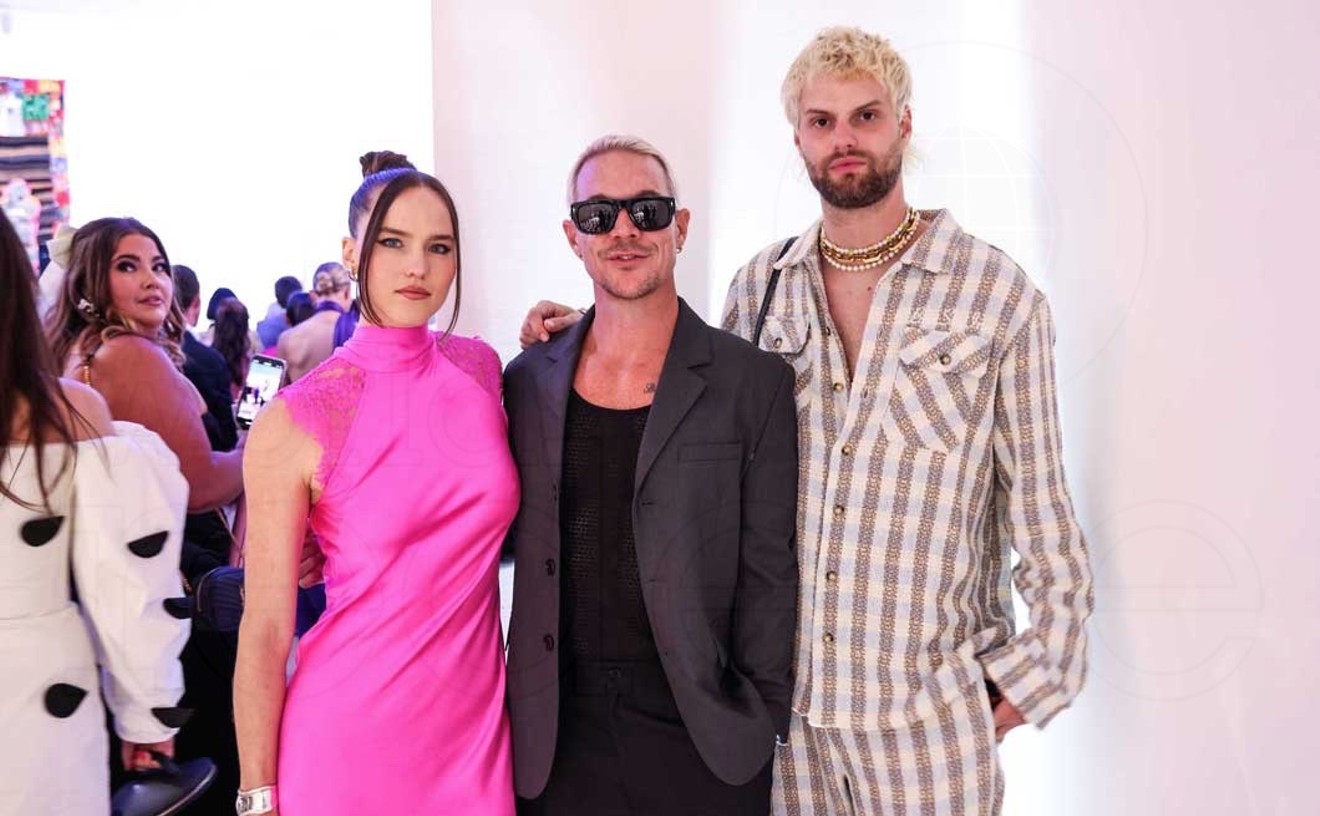In Venus in Fur at GableStage, even the weather is choreographed. The play opens with a bracing thunderclap, one of many meteorological intrusions from sound designer Matt Corey. There's no storm outside, at least not one we can see or hear battering the windows of the set. But, like brief commentaries from Thor, jolts of thunder interrupt the action whenever the intensity in the room grows palpable.
As it punctuates confrontations with operatic theatricality, the lightning takes on metaphysical weight, much the same as the play's main character transforms from aspiring actress to pissed-off mythological goddess.
One of the hottest properties off and on Broadway for the past three years, David Ives's Venus in Fur is a dense, elegant deconstruction of a play within a play based on a book inspired by a goddess. It's an example of art imitating life imitating art until the imitations disappear, guards are surrendered, and anything can happen.
Its execution places it firmly in the Theatre of Cruelty tradition, but its seemingly endless wellspring of ideas, provocations, surprises, and reversals makes just about every other contemporary play look like trifling fluff.
The production opens at the end of a long day inside a functional audition space, where Thomas (Matthew William Chizever), a playwright and director of some renown, has just auditioned 35 hopeless cases for the female lead in his latest production. Speaking with his fiancée over the phone, he expresses his frustration that he hasn't seen anyone "who can pronounce degradation without a tutor."
Degradation, in this case, isn't just any four-syllable word; it's at the heart of the story he's telling: an adaptation of Leopold von Sacher-Masoch's Venus in Furs, the controversial 1870 novel that introduced S&M into popular culture so thoroughly that the word masochism takes its name from the author.
As he's about to head home, a young woman bursts through the door like a cyclone. Played by Betsy Graver, she calls herself simply Vanda — the name of the dominatrix in Venus in Furs. She's much too late for her 2:15 audition, she says, even though no such appointment exists on Thomas's docket. An obnoxious motor mouth, she speaks Californian, littering her excuse-laden rambles with like and whatever, flicking back her blond hair like a vain Barbie doll, and expressing ignorance about the play and its literary origins. Yet she carries an oversize bag full of Vanda-centric prop changes and wears a scanty bit of leather fetishwear under her coat — seemingly one of those actresses who arrives superficially overprepared but fundamentally underprepared.
Against his better judgment, Thomas permits her to read three pages of the script and begrudgingly accepts her request that he read for the male part of Kushemski, the proto-fetishist. He is immediately transfixed, and to a point so are we: The bimbo can clearly act, pronouncing all of the playwright's ostentatious words with rehearsed skill and an unflappable European accent, and largely without the necessity of the script. Thomas is intrigued not by Vanda's knockout body in come-hither lingerie but by her apparent embodiment of his character. Like James Stewart in Vertigo, Thomas becomes a voyeur of his own creation — obsessed with the image, not the person behind it. Or so it seems.
Thus begins a multilayered game of wits and wiles, dominance and submission, male and female, actor and character in which Vanda's gentle suggestions turn into commands, and Thomas morphs from the director to the directed, resembling a helplessly tempted fish grabbing for every piece of hooked worm that she floats his way.
Venus in Fur is about many things — sexism (perceived or otherwise), pain, pleasure, manipulation, and repressed perversion. But it's especially about the theater itself, reveling in the process of character shaping, casting rapports, and the inspiration of the words as they spring from the page or the characters' minds in improvised flourishes. It's a 95-minute uninterrupted audition, and for stage buffs, it's thrilling to watch even without the kink.
Both of the central roles are unusually demanding, but all eyes will be on Graver first and foremost. She's playing the role popularized on Broadway by Nina Arianda, whose Tony-winning performance catapulted her to overnight stardom. These are impossible shoes to fill for any regional actress, so Graver eschews emulation, instead making the character her own. In Graver's portrayal, under Joseph Adler's direction, the laugh lines are fewer, their delivery less comic than disquieting. Graver works so well in this part because she's been typecast as single-celled ditzes so many times before — most recently in GableStage's Time Stands Still — that the annoying introduction of her character feels like another day at the office.
The revelations that ensue represent a breakthrough for both our perception of Graver and Thomas's perception of Vanda, adding another strata to this self-reflexive layer cake of a play. Her one character feels, appropriately, like many. She invariably takes on the personas of the naive ingénue, playful tease, cruel seductress, and otherworldly goddess — submitting, as it were, to each incarnation with the calculated dexterity of a master schemer, a feminist psychopath with an invisible whip and a very real knife hidden in her bag of tricks. I never knew she was capable of such transformation and abandon.
Chizever, in his GableStage debut, deserves credit as well. It seemed that on Broadway, Arianda rendered costar Hugh Dancy all but meek dust and bones. Here, Chizever is slower to acquiesce to Vanda's charms. He has genuine presence, and his transition from flustered creator to smitten slave is gradual and authentic.
Both his and Graver's readings were flawless on opening night. If anything could be improved, their sexual power plays in the end could use a bit more smoldering intensity, which might increase as Venus in Fur's run continues and the actors grow more comfortable performing uncomfortable acts in front of a discomfited audience.










